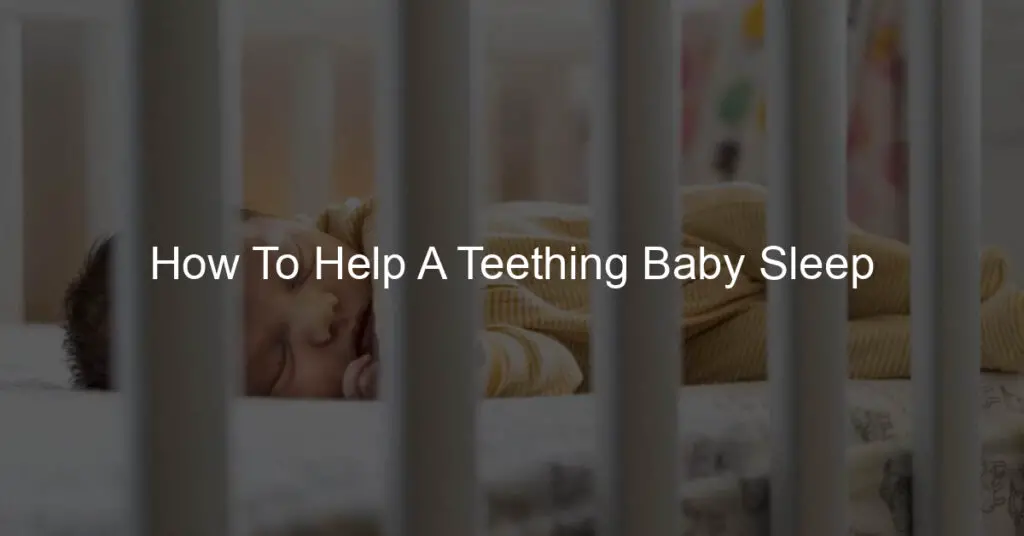Introduction: The Challenge of Helping a Teething Baby Sleep
As a parent, one of the most challenging phases you may encounter is when your baby starts teething. This period is often marked by discomfort and sleepless nights, not just for the baby, but for you as well. In this article, we will delve into the teething process and why it disrupts your baby’s sleep. We aim to provide you with valuable insights and practical tips to help your teething baby sleep better.
- Understanding the Teething Process
Teething is a natural process that every child goes through. It is the period when a baby’s first set of teeth, also known as primary teeth, begin to break through the gums. This process usually starts around six months of age, but it can vary for each child. Wikipedia provides a comprehensive overview of the teething process.
Teething can cause discomfort and pain for your baby. This is because the emerging teeth push through the gums, causing them to become swollen and tender. As a result, your baby may become irritable, and their sleep may be disrupted.
- Why Teething Disrupts Baby’s Sleep
Teething can significantly disrupt your baby’s sleep due to the discomfort and pain it causes. The pressure from the emerging teeth on the gums can lead to increased sensitivity, making it difficult for your baby to settle and sleep. This is particularly true at night when there are fewer distractions.
Moreover, teething can cause other symptoms like increased drooling, which can lead to coughing and choking, further disrupting your baby’s sleep. It’s important to understand that each baby experiences teething differently. Some may have a hard time with it, while others may not be as affected.
In the following sections, we will explore various strategies and remedies to help your teething baby sleep better. From understanding the basics to nighttime relief, we’ve got you covered. Stay tuned for real-life tips and case studies to help you navigate this challenging phase.
Teething Baby Sleep Tips: The Basics

When your baby is teething, it can disrupt their sleep and yours. Here are some basic tips to help your teething baby sleep better.
Creating a Comfortable Environment
A comfortable environment is essential for your baby’s sleep, especially during teething. Here are some factors to consider:
- Importance of room temperature: The room temperature can greatly affect your baby’s sleep. A room that is too hot or too cold can make your baby uncomfortable and disrupt their sleep. According to the American Academy of Pediatrics, the ideal room temperature for a baby’s room is between 68 and 72 degrees Fahrenheit.
- Choosing the right baby bedding: The right bedding can also make a big difference in your baby’s comfort. Choose soft, breathable fabrics that will keep your baby warm but not overheated. Avoid using blankets, pillows, or stuffed animals in your baby’s crib as they can pose a suffocation risk. Instead, consider using a wearable blanket or sleep sack to keep your baby warm.
Remember, a comfortable environment can make a big difference in helping your baby sleep better during teething. So, pay attention to the room temperature and choose the right bedding for your baby’s comfort.
Establishing a Nighttime Routine
Establishing a consistent nighttime routine is crucial for your teething baby’s sleep. It helps set their internal clock, making it easier for them to fall asleep and stay asleep. This routine comprises two key elements:
Setting a consistent bedtime
Consistency is key when it comes to bedtime. It’s advisable to set a specific time for your baby to go to bed every night. This helps regulate their body clock and makes it easier for them to fall asleep. According to a study, babies who have a consistent bedtime are more likely to have a better sleep quality and duration. Try to stick to this time as much as possible, even on weekends or holidays.
Implementing a soothing pre-sleep ritual
A soothing pre-sleep ritual can significantly help your baby relax and prepare for sleep. This could include activities such as a warm bath, a gentle massage, reading a bedtime story, or playing soft music. These activities signal to your baby that it’s time to wind down and get ready for sleep. A study shows that babies who follow a pre-sleep ritual fall asleep faster and have a longer sleep duration.
Remember, every baby is unique, and what works for one might not work for another. It might take some time and experimentation to figure out what works best for your baby. The key is to be patient and consistent.

Teething Baby Sleep Solutions: Remedies and Aids
When your baby starts teething, it can be a challenging time for both you and your little one. The discomfort can disrupt their sleep, leading to long nights and tired days. But don’t worry, there are remedies and aids that can help soothe your baby’s teething pain and help them sleep better.
Baby Teething Remedies
There are several remedies that can help alleviate the discomfort of teething and promote better sleep. Here are a couple of effective solutions:
Using teething rings: Teething rings are a popular remedy for teething babies. They are safe, easy to use, and effective. When your baby chews on a teething ring, it provides a counter-pressure to the emerging tooth, which can help alleviate the pain. It’s best to use a solid silicone teething ring, as they are durable and easy to clean. You can also chill the teething ring in the refrigerator for added soothing effect. However, never freeze them as it can get too hard and may hurt your baby’s gums.
Applying teething gels: Teething gels can provide temporary relief from teething pain. They contain a mild local anesthetic that numbs the gums and antiseptic to help prevent infection. However, it’s important to use them sparingly and only when other remedies are not providing enough relief. Always follow the instructions on the package and consult your pediatrician before using any medication on your baby.
Remember, every baby is different, and what works for one might not work for another. It’s all about finding what suits your baby the best. Always consult with your pediatrician before trying any new remedies.
Teething Baby Sleep Aids
When it comes to helping your teething baby sleep, there are several aids that can prove beneficial. Here, we will discuss two such aids: using white noise machines and introducing comfort objects.
- Using White Noise Machines
White noise machines can be a game-changer for parents struggling to get their teething baby to sleep. These devices produce a consistent, soothing sound that can mask other noises, helping your baby to relax and fall asleep. According to a Wikipedia article, white noise machines can also help to establish a sleep routine, signaling to your baby that it’s time to sleep.
- Introducing Comfort Objects
Comfort objects, also known as transitional objects or security blankets, can provide a sense of safety and security for your baby, especially during the teething phase. These objects can be anything from a soft blanket to a stuffed animal. A Wikipedia article explains that comfort objects can help your baby self-soothe, which is particularly useful during the night when they may wake up due to teething discomfort.
In conclusion, both white noise machines and comfort objects can be effective aids in helping your teething baby sleep. However, it’s important to remember that every baby is unique, and what works for one may not work for another. Therefore, it may take some trial and error to find the best solution for your little one.
Nighttime Teething Relief: Soothing a Teething Baby at Night

Teething can be a challenging time for both babies and parents, especially during the night. However, there are several techniques that can help soothe your teething baby and promote a peaceful sleep. In this section, we will explore two effective massage techniques that can provide relief to your little one.
Massage Techniques
Massage is a proven method to relieve discomfort and induce relaxation. It can be particularly effective for a teething baby. Here are two types of massages you can try:
-
- Gum Massage
A gentle gum massage can provide significant relief to a teething baby. Before you start, make sure your hands are clean. Using your finger, apply mild pressure on your baby’s gums in a circular motion. This can help alleviate the pain and discomfort associated with teething.
-
- Full Body Baby Massage
A full body massage can help your baby relax and sleep better. Start by massaging the legs and gradually move upwards. Use gentle strokes and maintain a rhythmic pattern. This can help soothe your baby and may also improve their sleep quality.
Remember, every baby is different and what works for one might not work for another. It’s important to be patient and try different techniques to see what your baby responds to best. With time and practice, you’ll find the perfect routine to soothe your teething baby at night.
Dietary Adjustments
When it comes to soothing a teething baby at night, dietary adjustments can play a significant role. Introducing certain foods and avoiding others can help alleviate the discomfort associated with teething. Let’s delve into this topic.
-
- Introducing Cold Foods
Introducing cold foods to your baby’s diet can provide a soothing effect on their sore gums. Foods like chilled cucumber slices, cold apple puree, or even a frozen banana can be a great relief. However, always supervise your baby while they’re eating to prevent choking.
2. Avoiding Certain Foods
While some foods can help soothe a teething baby, others can exacerbate the discomfort. Foods high in acid, like citrus fruits, can irritate the baby’s already sensitive gums. Similarly, hard foods can also cause more pain. It’s best to avoid these types of foods until your baby’s teething phase is over.
In conclusion, dietary adjustments can significantly help soothe a teething baby at night. By introducing cold foods and avoiding certain others, you can help your baby get through this challenging phase with less discomfort.
Case Studies: Real-life Tips for Teething Baby Sleep

Let’s delve into some real-life experiences and learn from parents who have successfully navigated the teething phase. These case studies will provide practical tips and insights that can help you manage your baby’s sleep during teething.
Case Study 1: The Power of Routine
Meet Sarah, a mother of two who swears by the power of routine. When her first child started teething, it was a nightmare. Her baby was fussy, irritable, and had trouble sleeping. However, with her second child, she was better prepared.
She established a strict bedtime routine and stuck to it, regardless of the teething symptoms. This routine included a warm bath, a soothing lullaby, and a bedtime story. She also used a teething toy to help soothe her baby’s gums before sleep.
| Key Takeaways |
|---|
| Establish a consistent bedtime routine. |
| Use a teething toy to soothe baby’s gums before sleep. |
| Stay patient and persistent with the routine, even during teething. |
According to Sarah, the routine provided a sense of security and predictability for her baby, which helped him sleep better despite the discomfort of teething. “The power of routine cannot be underestimated,” Sarah says. “It’s not just about getting your baby to sleep. It’s about creating a safe and comforting environment that helps them relax, even when they’re in pain.”
So, if you’re struggling with a teething baby who won’t sleep, consider establishing a consistent bedtime routine. It might just be the solution you’re looking for.
Case Study 2: The Impact of Dietary Changes
In this case study, we will explore how dietary changes can significantly impact a teething baby’s sleep patterns. It’s important to note that every baby is unique, and what works for one may not work for another. However, understanding the potential influence of diet can provide a useful tool for parents navigating this challenging period.
Meet Sarah and her 6-month-old baby, Emma. Emma started teething at around 5 months, and her sleep patterns began to change drastically. She would wake up frequently during the night, clearly in discomfort.
Sarah decided to consult with a pediatric nutritionist who suggested some dietary changes. The nutritionist recommended incorporating foods rich in calcium and vitamin D into Emma’s diet, as these nutrients are essential for healthy teeth development.
| Food | Calcium Content | Vitamin D Content |
|---|---|---|
| Fortified cereals | High | High |
| Dark leafy greens | High | Low |
| Yogurt | High | Low |
After a few weeks of these dietary changes, Sarah noticed a significant improvement in Emma’s sleep. She was waking up less frequently and seemed more comfortable during the night. While teething was still a challenging process, the dietary changes seemed to provide some relief.
This case study demonstrates the potential impact of dietary changes on a teething baby’s sleep. It’s important to consult with a healthcare professional before making any significant changes to your baby’s diet. However, understanding the role of nutrition in teething can provide another tool for parents during this challenging time.
Learn more about infant nutrition on Wikipedia.

Conclusion: Ensuring Baby Sleep During Teething
As we conclude this comprehensive guide on helping your teething baby sleep, it’s important to remember that each child is unique. What works for one might not work for another. However, with patience, love, and the right techniques, you can help your baby navigate this challenging phase with minimal discomfort.
-
- Recap of key takeaways
Teething can disrupt your baby’s sleep, but there are several strategies you can employ to alleviate their discomfort and ensure restful nights. These include maintaining a consistent bedtime routine, using teething aids like cold teething rings or a clean, damp washcloth, and providing comfort through gentle massages or cuddles. Over-the-counter pain relievers can also be used under a pediatrician’s guidance. Remember, it’s crucial to keep a close eye on your baby during this time to ensure they’re not in severe pain or distress.
-
- Encouragement for parents
Parenting is a journey filled with both challenges and joys. Teething is just one of the many hurdles you’ll face along the way. It’s normal to feel overwhelmed at times, but remember, this phase will pass. You’re doing an excellent job, and your efforts to comfort your baby during this difficult time are commendable. Stay patient, stay informed, and remember to take care of yourself too. You’re not alone in this journey, and the sleepless nights will soon be a thing of the past.
Thank you for reading our guide on ensuring baby sleep during teething. We hope you found it informative and helpful. For more tips and advice on parenting, continue to visit ubrood.com.














